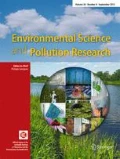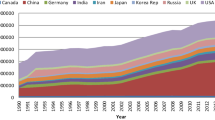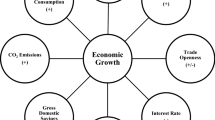Abstract
It was aimed to test the relation among the greenhouse gases emissions, economic growth, biofuels consumption, and militarization in G7 countries during the 1985–2015 period by Pedroni 1995 and panel Johansen tests and two long-run estimators—dynamic OLS and fully modified OLS. Long-run estimators found that economic growth and militarization have statistically significant positive impact on CO2 emission of G7 countries. Furthermore, the panel causality tests were applied: Dumitrescu and Hurlin (Econ Model 29(4):1450–1460, 2012) and panel Granger causality. These tests determined the causal relationship between the variables. The results of this paper implied that economic growth and biofuels consumption depend on militarization, and economic growth and militarization are granger causes of the greenhouse gases emissions.


Similar content being viewed by others
Notes
Because this test is currently not possible in Eviews to specify including a linear trend, it was transformed to be used by using the first differences of all variables. This transformation is appropriate for series containing a unit root; however, caution is required since trend stationary series become over-differenced.
References
ACORE (2014) Renewable energy for military installations: 2014 industry review. ACORE, Washington
Best G, Christensen JM (2003) Role of biomass in global energy supply. In: Larsen H, Kossmann J, and Sønderberg Petersen L (Eds.) Risø energy report 2. New and emerging bioenergy technologies. Forskningscenter Risoe, Risoe-R; No. 1430(EN), Denmark, 8–12
Bildirici M (2017a) The causal link among militarization, economic growth, CO2 emission, and energy consumption. Environ Sci Pollut Res 24:4625–4636
Bildirici M (2017b) CO2 emissions and militarization in G7 countries: panel cointegration and trivariate causality approaches. Environ Dev Econ 22(6):771–791
Bildirici M (2017c) The effects of militarization on biofuel consumption and CO2 emission. J Clean Prod 152:420–428
Bildirici M, Gökmenoğlu S (2017) Environmental pollution, hydropower energy consumption and economic growth: evidence from G7 countries. Renew Sust Energ Rev 75:68–85
Bildirici M, Ersin Ö, Kökdener M (2011) Genetic structure, consanguineous marriages and economic development: panel cointegration and panel cointegration neural network analyses. Expert Syst Appl 38:6153–6163
Clark B, Jorgenson AK, Kentor J (2010) Militarization and energy consumption: a test of treadmill of destruction theory in comparative perspective. Int J Sociol 40(2):23–43
Dumitrescu E-I, Hurlin C (2012) Testing for Granger non-causality in heterogeneous panels. Econ Model 29(4):1450–1460
EIA (2014) Biofuels are included in latest U.S. Navy fuel procurement. www.eia.gov/todayinenergy/detail.cfm?id=17271#
EPA (2010) The EPA’s renewable fuel standard program (RFS2) regulatory impact analysis.. EPA-420-R-10-006. Accessed 2/23/2016 at www.epa.gov/otaq/renewablefuels/420r10006.pdf
EPA (2017) Overview of greenhouse gases. www.epa.gov/ghgemissions/overview-greenhouse-gases
Ghouali YZ, Belmokaddem M, Sahraoui MA, Guellil MS (2015) Factors affecting CO2 emissions in the BRICS countries: a panel data analysis. Procedia Econ Financ 26:114–125
Givens JE (2014) Global climate change negotiations, the treadmill of destruction, and world society. Int J Sociol 44:27–36
IEA (2016) Energy and air pollution - world energy outlook 2016 special report. https://www.iea.org/publications/freepublications/publication/WorldEnergyOutlookSpecialReport2016EnergyandAirPollution.pdf. Accessed 08.08.2017
Im KS, Pesaran MH, Shin Y (2003) Testing for unit roots in heterogeneous panels. J Econ 115(1):53–74
Jorgenson AK, Clark B, Kentor J (2010) Militarization and the environment: a panel study of carbon dioxide emissions and the ecological footprints of nations, 1970–2000. Glob Environ Politics 10(1):7–23
Jorgenson AK, Clark B, Givens JE (2012) The environmental impacts of militarization in comparative perspective: an overlooked relationship. Nat Cult 7:314–337
Lane J (2014a) Navys NAVAIR completes supersonic ATJ flight with Gevos fuel. Biofuels Digest
Lane J (2014b) US Navy, DOE, USDA award $210M for 3 biorefineries and mil-spec fuels. Biofuels Digest
Larsson R, Lyhagen J (2007) Inference in panel cointegration models with long panels. J Bus Econ Stat 25:473–483
Larsson R, Lyhagen J, Löthgren M (2001) Likelihood-based cointegration tests in heterogeneous panels. Econ J 4:109–142
Levin A, Lin CF, Chu CSJ (2002) Unit root test in panel data: asymptotic and finite sample properties. J Econ 108:1–24
Menyah K, Wolde-Rufael Y (2010) CO2 emissions, nuclear energy, renewable energy and economic growth in the US. Energy Policy 38:2911–2915
Oliver JSG, Janssens-Maenhout G, Muntean M, Peters JAHW (2016) Trends in global CO2 emissions: 2016 report, PBL publication number: 2315
Pedroni P (1995) Panel cointegration: asymptotic and finite sample properties of pooled time series tests, with an application to the PPP hypothesis. Indiana University working papers in economics no. 95–013
Pedroni P (2001) Purchasing power parity tests in cointegrated Panels. Rev Econ Stat 83(4):727–731
Timilsina GR, Shrestha A (2010) Biofuels: markets, targets and impacts. World Bank policy research working paper, WPS5364. The World Bank, Washington
Timilsina G, Csordás S, Mevel S (2011) Under what conditions does a carbon tax on fossil fuels stimulate biofuels? Policy research working paper 5678
Wang Q (2010) Effective policies for renewable energy—the example of China’s wind power—lessons for China’s photovoltaic power. Renew Sustain Energ Rev 14:702–712
Wang Q, Chen X (2015) Energy policies for managing China’s carbon emission. Renew Sustain Energ Rev 50:470–479
Watters A (2016) Navy tests 100-percent advanced biofuel, Release Date: 9/16/2016. http://www.navy.mil/submit/display.asp?story_id=96702
Zorundi Z (2017) CO2 emissions, renewable energy and the environmental Kuznets curve: a panel cointegration approach. Renew Sust Energ Rev 72:1067–1075
Author information
Authors and Affiliations
Corresponding author
Additional information
Responsible editor: Philippe Garrigues
Rights and permissions
About this article
Cite this article
Bildirici, M. Impact of military on biofuels consumption and GHG emissions: the evidence from G7 countries. Environ Sci Pollut Res 25, 13560–13568 (2018). https://doi.org/10.1007/s11356-018-1545-x
Received:
Accepted:
Published:
Issue Date:
DOI: https://doi.org/10.1007/s11356-018-1545-x




